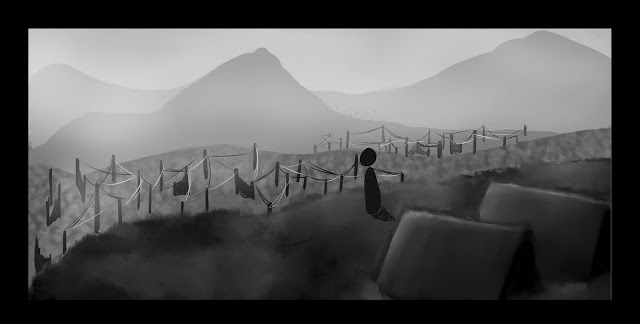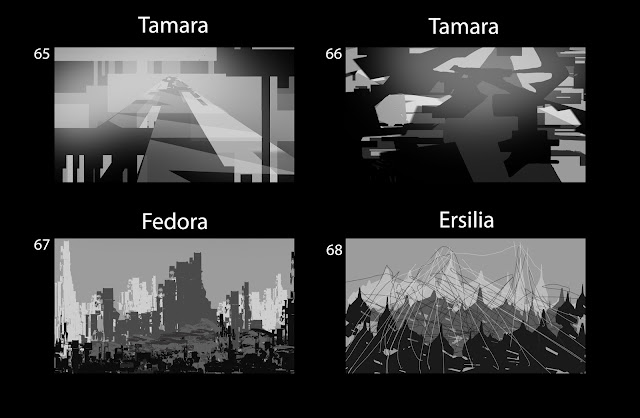Showing posts with label Space and Environment. Show all posts
Showing posts with label Space and Environment. Show all posts
Monday, 21 November 2016
Sunday, 20 November 2016
Thursday, 3 November 2016
What If? Metropolis | OGR - Part 1
What If? Metropolis by Alex on Scribd
Toolkits:
Maya Tutorials:
http://alexiscornwell.blogspot.co.uk/search/label/Maya
Life Drawing:
http://alexiscornwell.blogspot.co.uk/search/label/Life%20Drawing
Film Reviews:
http://alexiscornwell.blogspot.co.uk/search/label/Film%20Review
Photoshop:
http://alexiscornwell.blogspot.co.uk/search/label/Photoshop
Sunday, 30 October 2016
Monday, 24 October 2016
Film Review - 2001: A Space Odyssey
2001: A Space Odyssey was directed by Stanley Kubrick and released in 1968. The film has a confusing plot that leaves a lot up for interpretation, leading there to be many different idea's on the films story. One perspective of this is that 'The plot is not so much of structure but rather of events or moments in time that are united by the appearance of a large black monolith.' (Haflidason, 1968).
The camera shots used in the film also create a distance from the events as they keep the characters in the middle to back of the screen (see fig 3) and rarely move into the foreground. This creates a sense of distance as it is difficult to see the faces of the characters which makes it feel impersonal. There are few exceptions to this, one of the most prominent being the use of a close-up shot on the character of Dave as he is shutting down the computer HAL (see fig 4). The shots show the lack of emotion on Dave's face as he destroys a creation he had previously said was like another crew member. The scene evokes a sadness and sympathy that feels wrong given it's directed at a machine, a computer with dubious ability to think or feel independently of it's programming.
 |
| Figure 1: Movie Poster |
The use of music in 2001: A Space Odyssey is interesting as there are scenes where there is nothing but music and motion with nobody talking at all and also scenes where there is no sound at all, just the emptiness of space. This has prompted people to write that 'One of the more crucial elements of 2001 is the lack of sound that dominates the film, which is true to that there would be no sound in space (no atmosphere means no medium for sound transmission).' (Scott, 2009). The music used was classical music that wasn't created for the film. The use of a score designer for the film would have attempted 'to underline the action - to give us emotional clues. The music chosen by Kubrick exists outside the action.' (Ebert, 1997). This use of music encourages the viewer to observe the scenes as they happen instead of needing to respond to them the same way you would if the music was there to evoke a response.
 |
| Figure 2: Spacecrafts |
The camera shots used in the film also create a distance from the events as they keep the characters in the middle to back of the screen (see fig 3) and rarely move into the foreground. This creates a sense of distance as it is difficult to see the faces of the characters which makes it feel impersonal. There are few exceptions to this, one of the most prominent being the use of a close-up shot on the character of Dave as he is shutting down the computer HAL (see fig 4). The shots show the lack of emotion on Dave's face as he destroys a creation he had previously said was like another crew member. The scene evokes a sadness and sympathy that feels wrong given it's directed at a machine, a computer with dubious ability to think or feel independently of it's programming.
 |
| Figure 3 |
 |
| Figure 4 |
Bibliography:
Roger Ebert, 1997: 2001: A Space Odessey Review:
http://www.rogerebert.com/reviews/great-movie-2001-a-space-odyssey-1968
Almar Haflidason, 1968: 2001: A Space Odessey Review:
Ridley Scott, 2009: 2001: A Space Odessey Review:
http://www.dailygalaxy.com/my_weblog/2009/07/ridley-scott-science-fiction-is-dead.html
Images
Figure 1:
https://blogger.googleusercontent.com/img/b/R29vZ2xl/AVvXsEg9GAgI6Xhbdz6AJg_lk6-PnX_OUcCOgZhBjEm6PwMypHtshhLv6gjMbUS6gJIP6iedeRn79W57UQzOmqdsv8g9hwVWONvrbK6YH4cr9QR9tDfZIvcT0gP2sF_MDGCQecMfcj0h4WRQ1Pg/s1600/2001+A+Space+Odyssey+(1968)+Space+Station+One+by+Robert+McCall.jpg
Figure 2:
https://fogsmoviereviews.files.wordpress.com/2011/09/20110925-011821.jpg
Figure 3:
http://irenebrination.typepad.com/.a/6a00e55290e7c4883301bb07b7f1d9970d-800wi
Figure 4:
https://www.sfsymphony.org/getmedia/ee280956-c54f-41a5-b62d-a39c6b98e4e0/2001-Space-Odyssey?width=583&height=335&ext=.jpg
Invisible Cities | Reflective Statement
The Invisible Cities project overall has been a fun and interesting project to undertake. I feel that I learned a lot about how concept art works and how it is created. I feel like the project allowed me to work on my perspective drawing and that I now have a better grasp of how perspectives work in drawings. This project has shown me that while I did get everything finished when I needed to, I could have managed my time better and thus I will be working on bettering my time management for the next project.
Sunday, 23 October 2016
Film Review - King Kong
King Kong was released in 1933 and was directed by Ernest B. Shoedsack and Merian C. Cooper. The film tells the story of a filmmaker, Carl Denham, who hires a girl, Ann Darrow, and takes her to a mysterious Island for the filming of his movie. While the story tells the tale of a Beast it is done in such a way that the beast is not seen as inherently evil, instead seen more 'as a creature that in its own way wants to do the right thing' (Ebert, 2002).
 |
| Figure 1: Movie Poster |
The film being made in the 1930's is evident in a lot of the events that transpire, one that springs to mind being the depiction of the natives in the island scenes (see fig 2). Ebert writes that 'viewers will shift uneasily in their seats during the stereotyping of the islanders in a scene where a bride is to be sacrificed to Kong' (Ebert, 2002). The film has a clear underlying reference to slavery, as shown through the capture and further exhibition of Kong (see fig 3). The character of Ann Darrow is also a project of it's time as she is depicted as a damsel in distress for the majority of the movie and being saved by one of the men that previously insulted her.
 |
| Figure 2: The Islanders |
 |
| Figure 3: King Kong Captured |
The film itself is very influential, featuring special effects that were new for their time as well as a soundtrack featuring music specifically for each character and scene. The music is used to enhance the emotions for each scene, using suspenseful music to build suspense and calmer music to let the audience know when things are calmer. The films use of 'A gripping and fitting musical score and some impressive sound effects rate with the scenery and mechanism in providing "Kong" with its technical excellence' (Bigelow, 1933).
Bibliography:
Ebert, R. (2002) King Kong Review:
http://www.rogerebert.com/reviews/great-movie-king-kong-1933
Bigelow, J. (1933) King Kong Review:
http://variety.com/1933/film/reviews/king-kong-2-1200410783/
Images:
Figure 1:
https://s-media-cache-ak0.pinimg.com/originals/76/d1/10/76d110fc47a86432a70c7e9795b8cb96.jpg
Figure 2:
https://blogger.googleusercontent.com/img/b/R29vZ2xl/AVvXsEhYpk6TALcU6ck6s8jAX5bXRPPFECLSotBbDv5ZFw-u1KXnZ5negfGpdhy-OObtZ-2ueE28HwWmeu87cv5AVwzF7vkSkM-oM3mhHMByhJQmdcACpdPLyu3HlUDskDam_uTOA5OPcHXIPps/s1600/KingKong_059Pyxurz.jpg
Figure 3:
http://manapop.com/wp-content/uploads/2015/07/kong-on-stage.jpg
Friday, 21 October 2016
Thursday, 20 October 2016
Wednesday, 19 October 2016
Tuesday, 18 October 2016
Monday, 10 October 2016
Friday, 7 October 2016
Photoshop - Value Study and Collage Thumbnails
 |
| Value Study - Ersilia |
 |
| Collage Thumbnails |
Wednesday, 5 October 2016
Sunday, 2 October 2016
Photoshop - Word Map, References and Thumbnails - Zenobia
 |
| References and Word Map |
 |
| Zenobia Thumbnails created using above references |
Sunday, 25 September 2016
Subscribe to:
Posts (Atom)



























